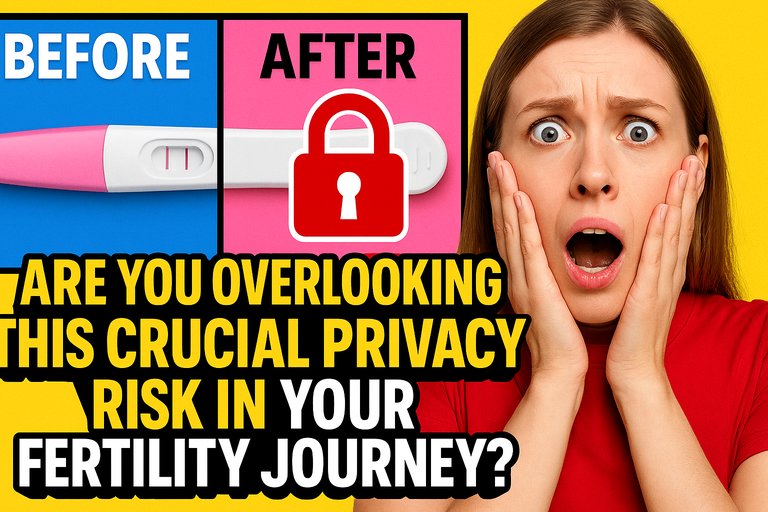
Picture this: You're excited, maybe a little nervous, and ready to take the next step on your journey toward parenthood. You've read every blog, downloaded every app, and found that perfect at-home insemination kit. But there’s a privacy question no one seems to be asking loudly enough: Who’s watching as you try to make a baby? If that makes your stomach flip a bit, keep reading—because what you don’t know could shape your family’s future.
Digital Parenting in 2025: The Privacy Plot Twist
If you’re anything like me, you probably assumed that what happens in your home (especially when it comes to starting a family) stays private. But these days, our digital footprints are everywhere—including the most intimate corners of our lives.
A recent article from the Electronic Frontier Foundation, “Congress Can Act Now to Protect Reproductive Health Data”, hit me hard. It’s not just about the data your smartwatch collects or your ovulation app tracks. Lawmakers and advocacy groups are raising alarms: our reproductive health info—stored in the cloud, shared with apps, or even sent to clinics—can be vulnerable to exposure, misuse, or worse.
So, what’s the actual risk? And what can you do about it—especially if you’re using fertility tech outside traditional clinics?
The Hidden Dangers Lurking in Your Fertility Data
Let’s break down what’s really at stake:
- Personal Info Exposure: Your most private moments—cycles, insemination attempts, pregnancy test results—could be floating around in databases you’ve never heard of.
- Data Sharing Without Consent: Some apps share or sell user data to third parties, sometimes even without clear notification.
- Legal Risks: In the current climate, reproductive health data could potentially be used in legal investigations depending on your state.
- Emotional Fallout: Imagine getting an ad for fertility treatments after a heartbreaking failed cycle. Now imagine a family member seeing it on your shared device. Ouch.
No one goes into parenthood expecting their intimate journey to become a data point for marketers or, worse, adversaries. But as the EFF article points out, until Congress acts, your digital privacy is shockingly easy to overlook—and even easier to lose.
What Can You Do? Real-World Steps for Digital Reproductive Privacy
Here’s the good news: You don’t have to surrender your privacy just because you want to grow your family with tech’s help. Here’s what I’ve learned (sometimes the hard way!):
1. Choose Discreet, Privacy-First Solutions
Look for companies who “get it.” For example—I love that MakeAMom ships every kit in plain, unmarked packaging (no neon “Fertility Supplies Inside!” sticker to mortify you at the front desk). They don’t just make reusable, cost-effective insemination kits—they make sure your journey stays yours.
2. Read (and Question) Privacy Policies
Yes, privacy policies are about as fun as a flat tire on date night. But take five minutes to scan: Are they selling your data? Is your info encrypted? If it’s not clear, email support and ask.
3. Use Apps Cautiously
If you’re tracking cycles, try using apps with robust privacy settings—or go old school and jot things down in a notebook. (Trust me, it’s a small trade-off for peace of mind.)
4. Limit Digital Paper Trails
Think twice before sharing reproductive plans via email or messaging apps—especially those that might back up to the cloud. And clear your search history if you're worried about nosy roommates or shared devices.
5. Advocate for Change
The EFF’s article is a call to action: urge lawmakers to create real protections for reproductive health data. Your voice matters, whether it’s a tweet, an email, or a conversation with your local rep. Future families need this.
The Open Loop: What Will the Future Bring?
It might feel a little scary—after all, you should only be worrying about baby names, not data breaches. But tech is also our ally. Advances in at-home insemination have already empowered so many would-be parents to take control of their journeys in the privacy of their own homes, with companies like MakeAMom leading the charge in both innovation and discretion.
So here’s the final question I keep coming back to: If we demand better privacy protections, how much more empowered could our generation of parents become? It’s a conversation worth having—at the dinner table, on social, and in the halls of Congress.
TL;DR: Your Journey, Your Data, Your Rules
Parenthood is one of the most personal adventures you’ll ever embark on. Don’t let tech’s privacy pitfalls steal your joy or your agency. Stay informed, choose trustworthy tools, and speak up for change. After all, your future family deserves nothing less.
What steps have you taken to protect your reproductive health data? Got tips or horror stories? Drop them below—I’d love to hear how others are navigating this wild, hopeful, and sometimes vulnerable new world of digital parenting!